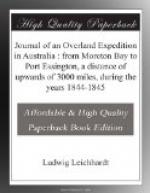Sept. 22.—I sent Mr. Calvert and Charley back to fetch the bullock, whilst we continued our journey up the river. The country maintained the same character, being open and well-grassed. At the end of about seven miles, we came to a range of sandstone hills with horizontal strata, deeply fissured and worn by the waters and the atmosphere. A creek at the northern side of the range was dry; but, at its southern foot, there was another, which contained several small pools and two deep rocky basins with an ample supply of water. Here, therefore, we encamped to wait for our old bullock, which I now resolved to kill; being well aware that he would be a constant drawback to our progress. Wallabies were exceedingly numerous, and their tracks as broad as the foot-paths of the natives. Our lat. was 16 degrees 5 minutes 26 seconds; long. according to reckoning, 136 degrees 10 minutes.
Mr. Calvert and Charley had succeeded in driving our bullock to within about three miles of our camp, where he had again lain down. As soon as the moon rose, I went with Charley to bring him on; but when we came to the place where they had left him, he was gone. It was impossible even for Charley to track him in the uncertain moonlight; and, as the night was very cold and foggy along the flats and hollows of the river, we made a fire, to wait for daylight. By a most unfortunate accident, my hat caught fire, and was consumed in an instant; it was a great loss to me in such a climate, and under daily exposure to a most powerful sun. I had to make shift with a small bag made of strong canvass, the long end of which I turned over my face to shade it. When the sun rose, we resumed our search, and succeeded in finding the poor beast, after tracking him for six miles across the country; he had evidently rambled in search of water, and had generally been attracted by shady hollows, in which any one would have reasonably expected to find it. He had, however, been completely unsuccessful; the hollows appeared to have been dry for a very long time; he travelled tolerably well to our camp, where he was immediately killed, skinned, quartered, and cut up. His meat was not quite so flaccid and watery as that of our last bullock; but it was by no means good. He was an old, and a heavy beast, and the experience we had of him strongly corroborates my observations, that such beasts can neither bear the fatigues of a long journey, nor travel with a load, unless regularly well fed and watered.
On this occasion we made a grand discovery, of which we afterwards profited greatly. A portion of the skin of the bullock was dried, and a certain quantity was added to our soup at night; which we soon found to be not only a great improvement, but to be in itself much preferable to the tasteless meat of our knocked-up bullocks. The stomach was also made use of on this occasion, as our useful dog, Spring, was well provided with emu meat. We had our last pot of tea on the 22nd, and we were now fairly put on dry beef and water.




